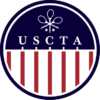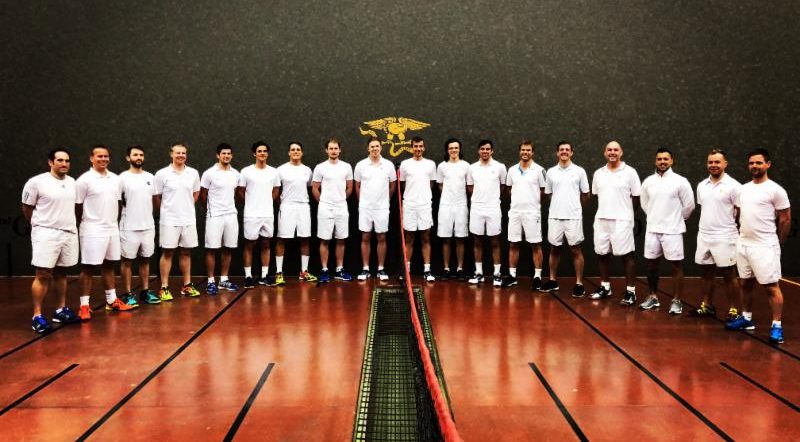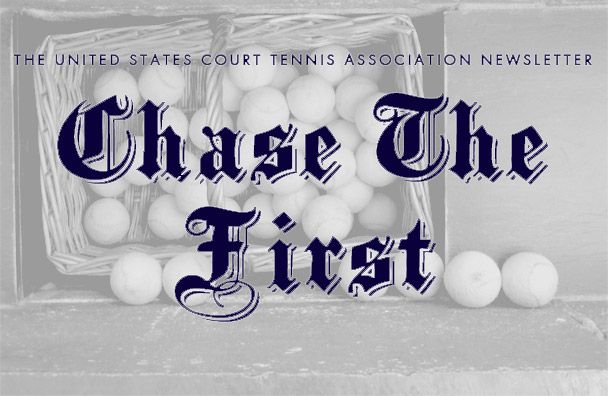The 77th annual Payne Whitney Memorial Inter-City Cup, played at the Racquet & Tennis Club on 11-13 December 2009, was again a diabolically close and unpredictable affair, An amalgam of Newport and Boston, New England again drank champagne out of the cup.
The play was magnificent. Never before had such a completely high and deep caliber of talent participated in the Whitney Cup. Twenty-four of the twenty-five top U.S. amateur players played (the only one missing, Will Broadbent, was at the club but injured). Joining the four new Whitney Cup players were a throng of wily veterans, some of who had played in more than thirty Cups.
No actuarial degree was needed. It was close. Six of the seven dual-matches were 3-2. Eighteen of the eighty-eight sets were 6-5. Many of these sets (including two match-clinching ones in the final) were 40-all, no-ad game, set and match balls. Eighteen of the thirty-five matches went to three sets. Ten teams clawed back from an opening set loss to win. Very few teams played poorly, as twenty-four of the thirty pairs managed to win at least one match; yet surprisingly only four tandems went undefeated and only one (Washington’s #2 Bill Barker & John Motz) tallied the maximum of three victories.
It was a wonderful weekend. Tournament chairman Alexis Hombrecher and referee Mike Gooding kept it all running smoothly, assisted by a squadron of eagle-eyed markers: Andrew Fowler, Neil Smith and James Stout. The crowds were thick in the dedans from eleven on Friday morning until half past three on Sunday afternoon when the matches concluded. The USCTA’s twelfth annual dinner provided an engrossing accompaniment, as did a few bloody bulls at the St. Regis. Peter DiBonaventura, great grandson of Payne Whitney, brought in the cup itself, in its green velvet-lined carrying case, as well as a fascinating collection of memorabilia (trophies, photographs, menus, signatures) from Greentree which hosted the Cup in Manhasset, Long Island until 2001.
Upsets abounded. New England’s #1 Jeremy Wintersteen & Matt Porter were down 3-0 in the second to New York’s Alexis Hombrecher & Jonathon Larkin before reeling off nine straight games to take the match. Greentree/Aiken beat New England 3-2 (the last two matches on court went to 5-all in the third) but because New York beat Greentree/Aiken and then New England ended up topping New York, New England snuck into the final based upon losing one less set than their two opponents. And having New England (captained by Wintersteen) and Washington (Rich Moroscak) in the final, just like in 2008, meant that for the first time since the Whitney Cup was started in 1930, two years would pass without either Philadelphia, New York or Greentree winning the event.
Last year, New England snagged the Whitney Cup by the slimmest of margins (in two different matches Washington was within two points of winning) and it was again nip-and-tuck. Half of the 2009 Whitney Cup matches could be designated an upset, based up on the official doubles handicaps of the pairs involved. Nowhere was this more evident than in the second-most unexpected result, in the opening seniors match at the Sunday morning final. Washington’s Haven Pell & Robin Martin overcame a 4.2 handicap difference to beat New England’s Alex Walsh and Jonathan Pardee in an epic battle 2-6, 6-5, 6-5. The last set inevitably went to 40-all, and after a long, tense rally, Pell walloped a main wall force into the dedans for the win. New England took the next two and Washington the following match (all three were oddly three-setters with no set closer than 6-2) to set up one final match. Newcomer Preston Quick (the former national squash singles and doubles champion and pro at the Union Boat Club in Boston) teamed up with veteran George Bell to escape with a nail-biter. At 40-all, no-ad at 5-all in the second set, Bell slammed three straight main-wall forces at Washington’s Bradley Allen, who was desperate to push the match into a third set. Allen shoveled the first two back but could not reach the third, which found the netting.


